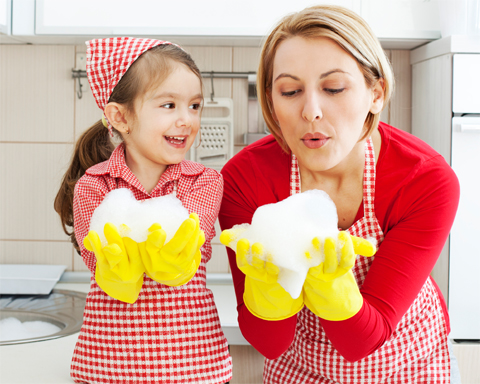“His master replied, ‘Well done, good and faithful servant! You have been faithful with a few things; I will put you in charge of many things. Come and share your master’s happiness!’ (Matthew 25:21, NIV)
How Kids Think
The words, “You are so irresponsible!” can cause irreparable damage to a child’s heart. Most kids desperately want to measure up to our expectations. They want to gain our approval. But sometimes adults do not show children how to be responsible in performing a duty. Our neglect results in their lack of helpfulness, and lack of ownership in daily tasks.
How God Thinks
God holds each person responsible for his or her thoughts, words, and deeds. Responsibility (or irresponsibility) is a learned behavior. Unless a child is trained to be responsible, he or she will probably follow the path of peers or pleasure. As children learn to be faithful in small ways, this paves the way for them to tackle larger responsibilities (Matthew 25:21).
True Story
Kyle loved to learn new things, but in the process of a new project he often struggled to clean up afterwards. One morning Kyle asked mom “Can I please grate some cheese?” He was so excited to practice this new skill and was thrilled when mom agreed—with the simple stipulation that he keep cheese off the floor.
Soon Kyle was busily cutting slivers of cheddar cheese with the metal slicer! Ellie, his younger sister, ate some and had fun crumbling others onto the table and carpet. Before long, the floor was littered with bits of cheese. Mom saw the teachable moment, “Kyle, since some cheese did make it onto the floor, I am going to teach you how to vacuum. That is the best way to clean up this kind of mess.”
Mom patiently showed her son how to use the vacuum cleaner, watching his progress closely. Kyle began pulling up small pieces with the long hose while sister helped by picking up larger slivers. Ten minutes later, the job was done—with only minor assistance from mom. The young “chef” learned that it was his job to clean up the mess created by his new skill.
This important lesson heartened mom to encourage Kyle to try new things because he now faithfully cleaned up after himself. Other projects followed—inventions in the garage, painting, building backyard brick walls, and helping with meals. Now mom only occasionally reminds Kyle to clean up after himself—he does it on his own most of the time. Mom increasingly trusts him to use all kinds of tools to create things or practice new skills because he cleans up afterwards—usually using a vacuum!
Personal Example
My father loved gardening alongside his children. To him, gardening was not just a task—it was an art! On a sunny Saturday morning, he carefully laid out the seed pots, gardening tools, and work gloves. He showed us how to plant, water, and cultivate carrots, onions, zucchini, tomatoes, and strawberries. Zucchini was always easiest to grow in our yard. With minimal work, a fat, forest-green squash would emerge.
One year I attempted to grow watermelons, a more finicky plant with specific water, sunlight, and soil needs. Four months of labor and care resulted in a grapefruit-sized melon. Though this was my first try, I was disappointed. I had pictured grocery-sized melons!
As I looked at my dismal fruit, my dad sat down and asked, “Are you watering it every day? It takes four months to grow; have you remembered?” I ruefully admitted, “Well, sometimes I forget!” Dad smiled, “It’s hard for a melon to grow in this hot weather without lots of water. To grow well it needs water every day.” I smiled sadly and remembered the times I thought about watering it, but then decided to “do it later.” Afterwards, of course, the mental note flew from my mind. Though I wanted the succulent watermelon, I had not done the job well. Without faithfully watering every day, the fruit I desired didn’t materialize.
What You Can Do
Help your child take small steps of responsibility. Clearly model a skill, explain expectations, and offer abundant praise as he or she learns each new task. Increase opportunities as your child grows in faithfulness!
- Observe Bible Heroes. Study Joseph (Genesis 39-41), Samuel (1 Samuel 2-3), Ruth (1-4), Daniel (1-2), and Esther (2). Discuss with your child how these individuals learned to be responsible to God and people.
- Celebrate Growth. Start with small jobs. Affirm when your child gets it right. Give specific and clear feedback along the way.
- Increase Privilege with Maturity (Matthew 25:21, Luke 16:10). As your boy or girl is faithful with small things, give him or her new opportunities. Take bigger steps each time, increasing the responsibility.
- Understand sowing and reaping (Galatians 6:7-10). Just as cultivating a garden yields a crop, faithfulness with children will eventually result in a harvest. Instead of expecting instant results, patiently instruct and affirm—the harvest will be worth it!
Discipleship Begins With Our Children
Children need meaningful, shared-life relationships. That’s the heart of discipleship. DiscipleLand’s family of Biblical resources forms a complete Children’s Discipleship System™ – an intentional, relational, and transformational process designed to help children know God intimately, love Him passionately, and to serve Him selflessly. Click here for your Free Catalog
Learn more by clicking on the following:
• Samples
• Nursery and Toddler
• Preschool
• Kindergarten
• Elementary
• Kids Church
• Midweek
• Free Catalog






